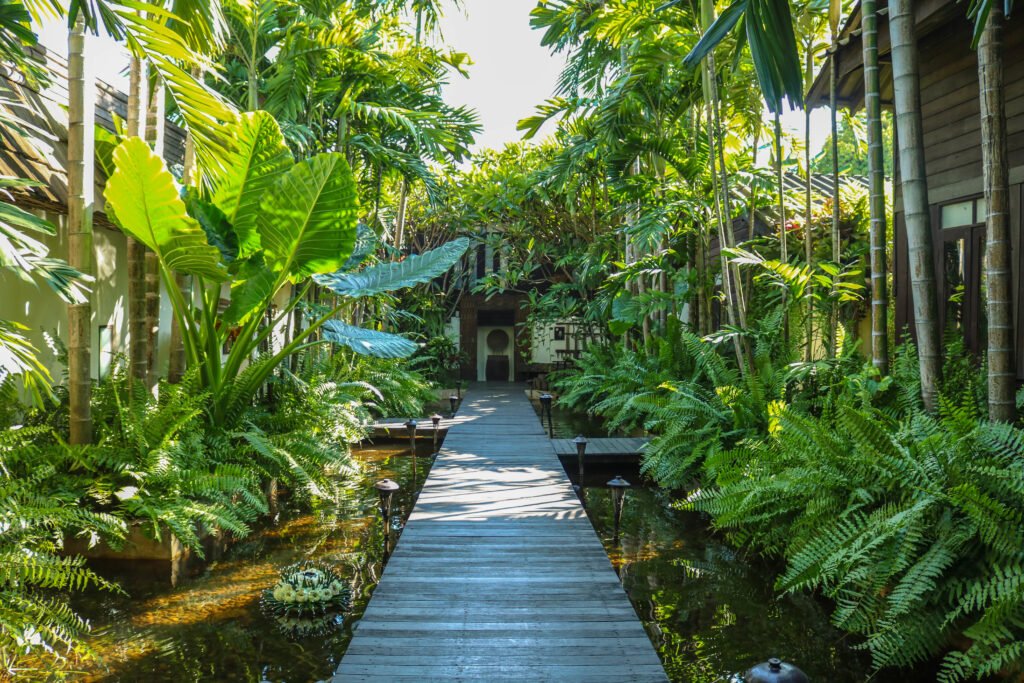Getting Started with Hawaii Landscaping: License & Business Requirements Explained
Licensing allows you to promote your Hawaii landscaping business more widely, bid on public and private contractors, broaden the services you offer, and build trust with homeowners. Landscaping businesses are much more than just mowing lawns and planting flowers in paradise. It’s about turning your green thumb into a profitable licensed enterprise that complies with local regulations.
If you plan to offer landscaping services in Hawaii, including landscape design Hawaii, you’ll need to meet specific licensing and business requirements before you operate. Everything you need to know about getting licensed in Hawaii—from eligibility rules to exam details—is covered in this article.
License Requirements for Landscape Design Hawaii and Landscaping Services
To start a landscaping business in Hawaii, you’ll need to understand several licensing tiers and associated requirements.
a. Landscaping Business
i. Contractor License (C-27)
Landscapers must hold a state license issued by the state’s Contractors Licensing Board to work in Hawaii. You’ll fall under Classification C as a specialty contractor and need to hold a C-27 landscaping contractor license. There is also a C-27b tree trimming and removal contractor license. These licenses cover land preparation for architectural horticulture, tree trimming, decorative treatments, and arrangements of gardens and plants, among other services. This license allows you to legally offer landscape services, just like professional firms such as Landscape Hawaii Inc.
ii. License Levels Based on Project Size
There are no formal “tiers” based on square footage like in some states, but larger projects, particularly commercial or municipal landscaping, may require solid documentation, including performance bonds and comprehensive insurance—especially for landscapers Honolulu HI handling high-value or city contracts.
However, to understand:
1. Small residential yards – Basic trimming, planting, and mowing (may not need a license if under a certain dollar amount).
2. Medium-size properties – Multi-family housing units, office grounds, or schools.
3. Large-scale commercial projects – Resorts, hotels, public parks, and highways (will need full license and insurance).
iii. Subcontractors
Subcontractors working under a licensed landscaping company do not need their own license, as long as they are hired directly by the licensed business and do not contract independently—this applies to projects across the state, including landscaping Kauai services.
iv. Application & Forms
Application for the C-27 Landscaping Contractor license, via: Professional & Vocational Licensing Division | Contractors License Board

Make sure to:
Submit only a complete application.
Provide proof of experience (typically 4 years in the last 10).
Pass the Hawaii Business and Law exam and the trade exam.
Pay applicable fees (usually around $300+).
b. Pest Control Services
i. Commercial Applicator License
If you use restricted-use pesticides as part of your landscaping service, including landscaping Maui projects, you’ll need to be certified by the State of Hawaii Plant Industry Division. You’ll need a commercial applicator certification in one of eleven categories, such as Ornamental and Turf Pest Control. You’ll need to pass an exam.
To qualify:
1. Pass the main Exam plus a specific category exam (like Ornamental and Turf pest control).
2. Attend pesticide safety meetings regularly to stay updated on laws and environmental practices.
Link: Plant Industry Division | Pesticides Branch

c. Nursery Dealer Licensing
If your landscaping work includes selling plants, you’ll also need nursery-related licenses:
i. Nursery Dealer License
Anyone selling nursery stock may need a Nursery Dealer License. It ensures you’re sourcing healthy plants and complying with agricultural laws to prevent invasive species. If you’re also applying for a landscaping contractor license, be sure to check if plant sales are covered under your scope. Look for “Nursery Dealer License” forms.
Via:Plant Industry Division | Plant Quarantine Branch

ii. Nurseryman Certification
If you grow plants for sale, then you’ll need to become a certified nurseryman in Hawaii. Depending on scale and plant types, a separate certification is required for that. This ensures plant health and disease control, which is crucial in Hawaii’s delicate ecosystem and essential for maintaining high standards in Hawaii landscaping.
d. Other Legal Requirements
i. Surety Bond
Before the Contractors License Board will issue your landscaping license, you must obtain a $1,000 minimum surety bond. This provides financial protection to consumers who may be harmed if a contractor violates licensing laws or fails to complete work. For those offering services like landscape design Hawaii, this bond is a key requirement. Licensed landscaping contractors must maintain an active surety bond at all times. If it gets cancelled or revoked, your license will be automatically suspended until you secure a new bond.
You can purchase a Hawaii surety bond from any company authorized by the state Insurance Commissioner. The annual cost is usually around $200 depending on your personal credit and company finances. Established firms like Landscape Hawaii Inc typically maintain these bonds to stay compliant and protect their clients.
When applying for your initial landscaping license, you’ll need to submit proof that the surety bond has been filed with the Contractors License Board.
ii. Insurance
In addition to a surety bond, landscaping contractors must carry certain insurance policies:
General Liability Insurance
$100,000 for bodily injury per occurrence.
Property Damage Coverage
$50,000 per occurrence.
Hawaii Disability Compensation Insurance: This mandatory policy provides medical treatment, wage replacement, vocational rehabilitation, and other benefits.
($5,000 minimum for employee/customer injury on-site).
Other types of insurance that can protect landscaping businesses include:
Commercial Property.
- Commercial Auto Insurance.
- Worker’s Compensation.
- Professional Liability
You may also want to consider vehicle insurance if you hire employees or use company trucks. Many landscapers Honolulu HI carry this coverage. An insurance broker can help you determine the right insurance coverage for your business.
iii. Business Registration
For registration apply to the Hawaii Department of Commerce and Consumer Affairs (DCCA), Business Registration Division, with correct & required documents with correctly filled application form.
Some requirements you have to meet before registration;
Age: At least 18 years old.
Experience: four years of experience within the past 10 years.
- Good reputation: candidates must demonstrate a reputation for honesty, integrity, and fair dealing.
- Employ a qualifying RME: An actively involved Responsible Managing Employee (RME) must be designated for the company. The RME should have the same minimum experience as the applicant.
- Business registration: The company must be registered with the Hawaii Business Registration Division before applying. This can be done online or via mail.
Once your application is approved, you’ll need to pass two licensing exams administered by PSI Exams:
- C-27 Landscaping Trade Exam
- Business and Law Exam
The C-27 exam covers topics like irrigation, plant materials, pest management, soils, hardscaping, and safety. The B-law exam covers business organization, estimating, labor laws, taxes, and other key subjects.
After passing the exams, the Board will advise you on any final steps to complete the licensing process. This may include submitting current insurance certificates. Whether you’re working on a project in Honolulu or doing landscaping Kauai work, once all requirements are satisfied, the Board will issue your official contractor license certificate by mail.
Meeting all the prerequisites and submitting a complete application helps ensure your approval for Hawaii contractor licensing exams.

From here, you can:
-Register your business name.
-Apply for an LLC or corporation.
-Obtain a Hawaii Tax ID (GET license).
OTHER IMPORTANT LINKS YOU SHOULD KNOW
Tax Licenses:
LANDSCAPING ASSOCIATIONS IN HAWAII
Joining a local landscaping association can offer immense benefits, from networking to certifications. Consider becoming a member of the:
Hawaii Landscape and Irrigation Contractors Association (HLICA)
Offers workshops, training, and updates on state regulations.
Website: hawaiiscape.com
You can also engage with:
American Society of Landscape Architects – Hawaii Chapter
Professional recognition and continuing education for landscape architects.
NOTES FOR YOUR JOURNEY
- Check application timelines. Some licenses take 4–6 weeks to process.
- Keep digital copies of every application and payment receipt.
- Renew annually where required — especially pesticide licenses.
- Stay updated on Hawaii’s environmental and land-use regulations.
Let this guide be your launchpad into the lush, profitable world of landscaping in Hawaii.
Do I need a license to offer Hawaii landscaping services?
Yes, most Hawaii landscaping jobs require a contractor license, especially if they involve construction or design.
Is a special certification needed for landscape design in Hawaii?
While there’s no specific license for landscape design Hawaii, projects involving hardscapes, grading, or irrigation may require a contractor license. Designers should also comply with local permitting and zoning laws.
Does Landscape Hawaii Inc follow different licensing rules?
No, Landscape Hawaii Inc, like all professional firms, must follow Hawaii’s contractor licensing laws. They are a licensed entity and a good example of proper compliance for those entering the industry.
Are landscapers in Honolulu, HI required to be licensed?
Yes. Most landscapers in Honolulu, HI must hold a landscaping contractor license if they perform construction-related tasks or work on projects valued over $1,500. Always check with Honolulu’s DCCA for local requirements.
Is there a difference in licensing for landscaping in Kauai or Maui?
While the statewide rules apply, landscaping in Kauai and landscaping in Maui may involve additional county-level permits and environmental regulations. Always confirm with local authorities before beginning work.






